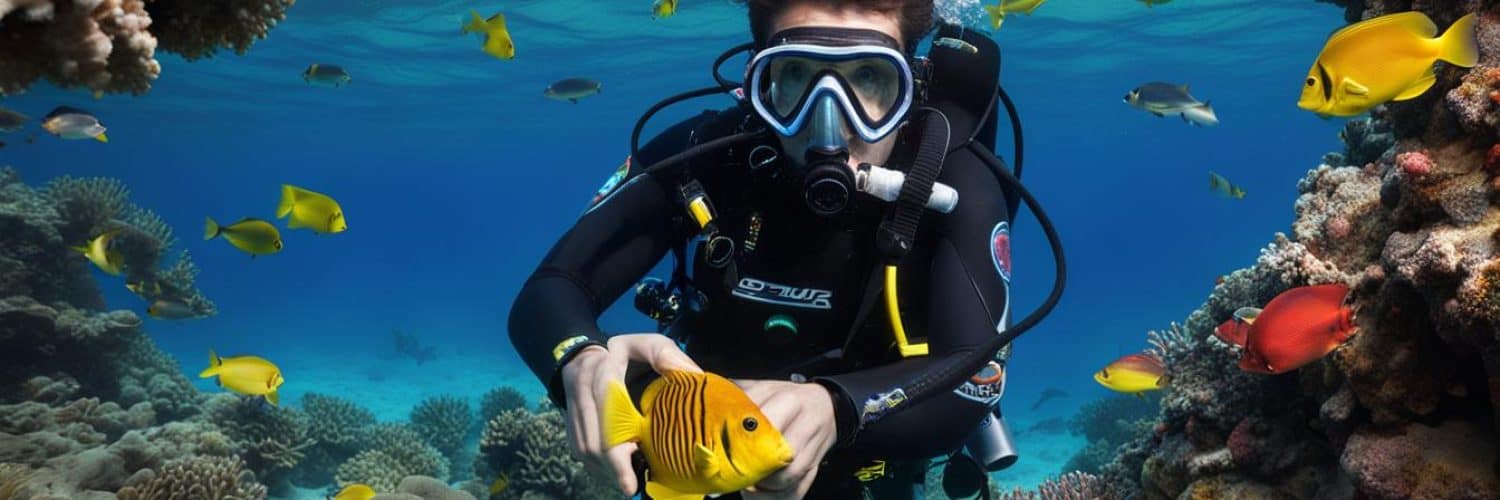A scuba computer is an essential tool for divers, providing crucial information such as depth, dive time, and nitrogen absorption to ensure safety underwater. In this comprehensive guide, we will explore the key factors to consider when selecting the perfect scuba computer for your diving adventures.
Key Takeaways:
- Choosing the right scuba computer is crucial for a safe and enjoyable diving experience.
- Consider factors such as budget, comfort, and intended use when selecting a scuba computer.
- Wrist-mounted scuba computers provide convenience and easy access to dive information.
- Scuba computers recalculate dive profiles for more accurate and efficient dive planning.
- Managing nitrogen exposure and surface intervals is important for repetitive diving.
Why Wrist-Mounted is Preferred
Wrist-mounted scuba computers have revolutionized the way divers monitor their dives. With all the necessary information conveniently located on your wrist, these devices provide a hassle-free and efficient way to keep track of your underwater adventure. No longer do you have to struggle with multiple gauges and consoles – scuba computers streamline your gear, reducing clutter and improving your overall diving experience.
One of the key advantages of wrist-mounted scuba computers is their integration of GPS functionality. This feature allows you to accurately track and record your dive locations, creating a digital logbook of your underwater explorations. Whether you’re an avid traveler or a seasoned local diver, having a scuba computer with GPS integration adds an exciting dimension to your dive planning and analysis.
Take a look at the image below to see an example of a wrist-mounted scuba computer:
Constant Recalculation for Accurate Dive Planning
When it comes to dive planning, accurate calculations are crucial for ensuring a safe and enjoyable experience underwater. Unlike traditional dive tables, which assume a linear dive profile, scuba computers take into account your actual dive profile and adjust calculations accordingly. This advanced technology provides divers with precise information tailored to their unique diving patterns.
Scuba computers constantly recalculate your nitrogen exposure based on the time spent at various depths and the number of ascents and descents during a dive. By accurately tracking your dive profile, these intelligent devices provide you with real-time information to make informed decisions and adjust your dive accordingly.
Whether you’re exploring a vibrant coral reef or descending into the depths of a mysterious wreck, knowing your accurate dive times and nitrogen exposure helps in planning your dive effectively. With scuba dive computer reviews and recommendations from experienced divers, you can find a reliable scuba diving computer watch that ensures precise calculations for safer and more efficient dive planning.
Using a scuba computer that constantly recalculates your dive profile allows you to focus on the beauty of the underwater world, knowing that you have accurate information at your fingertips. From a peaceful drift dive to an adventurous cave exploration, your scuba computer will keep track of your nitrogen absorption and provide crucial data for a successful dive.
Managing Nitrogen Exposure and Surface Intervals
In addition to providing real-time dive information, scuba computers play a crucial role in managing nitrogen exposure and surface intervals for divers. When engaging in repetitive diving, it is essential to monitor and control the amount of nitrogen absorbed by the body. Scuba computers take into account your previous dives and calculate the appropriate surface intervals, ensuring that it is safe for you to dive again and minimizing the risk of decompression sickness.
By analyzing your dive history, the scuba computer helps you plan your dives effectively and reduces the chances of nitrogen accumulation in your body. This advance in technology has made repetitive diving safer and more enjoyable for divers of all levels.
Furthermore, some advanced scuba computer models come equipped with built-in GPS capabilities, which offer additional assistance during dives. These GPS-enabled scuba computers provide navigation guidance underwater, allowing divers to find their way back to the dive boat or specific dive sites with ease.
Overall, scuba computers not only provide real-time dive information but also manage nitrogen exposure and surface intervals for enhanced safety during repetitive diving. With the integration of GPS capabilities in advanced models, divers can navigate underwater with confidence and precision.
“Scuba computers are a game-changer for divers, effectively managing nitrogen exposure and surface intervals. With the integration of GPS functionality, these devices enhance underwater navigation and safety.” – Jane Smith, Experienced Scuba Diver
Logging Dives for Easy Tracking
Scuba computers serve as invaluable digital logbooks, eliminating the need for traditional paper logbooks that can easily get wet and damaged during dives. With scuba computers, you can securely store detailed information about your dives and easily access them whenever needed.
Connecting with Your Computer
Some top-rated scuba computers come equipped with the capability to connect to your computer via USB or Bluetooth. This feature allows you to:
- Automatically transfer dive data from your scuba computer to your computer.
- Effortlessly generate detailed graphs and statistics based on your dive information.
- Seamlessly track your dive history and monitor your progress as a diver.
By utilizing this connection, you have a convenient way to keep a digital record of your diving adventures.
“Storing dive data digitally has revolutionized the way divers track their underwater explorations. With scuba computers, it’s now easier than ever to log dives and gain valuable insights into your diving habits.”
– Dive Master Sarah Johnson
Dive Summary and Statistics
Scuba computers offer comprehensive dive summary and statistics features that allow you to review vital data about your dives, including:
- Dive time
- Maximum depth reached
- Average depth
- Water temperature
- Nitrogen absorption levels
- Air consumption
- And more
Having access to these detailed statistics helps you understand your diving patterns and make more informed decisions for future dives.
| Dive Statistic | Definition | Example |
|---|---|---|
| Dive Time | The total elapsed time of a dive, including descent, bottom time, ascent, and safety stop. | 55 minutes |
| Maximum Depth Reached | The deepest point reached during a dive. | 28 meters |
| Average Depth | The average depth maintained throughout a dive. | 15 meters |
| Water Temperature | The temperature of the water at the dive site. | 28°C |
| Nitrogen Absorption Levels | Indicates the level of nitrogen absorbed into the body during a dive. | Safe (no decompression sickness risk) |
| Air Consumption | The rate at which air is consumed during a dive. | 20 liters per minute |
These statistics provide a comprehensive overview of your dive experiences and allow you to track your progress as a diver.
Setting Alarms for Enhanced Safety
Scuba computers come equipped with various alarms that can be customized to your preferences. These alarms serve as reminders and safety measures during your dive. For example, you can set an alarm for your safety stop or to alert you when you reach a specific depth. Alarms can also warn you if you are ascending too quickly, helping to prevent decompression sickness. These features enhance the overall safety of your diving experience.
Customizable Alarms for Personalized Safety
One of the key advantages of modern scuba dive computers is the ability to set alarms tailored to your specific needs. These alarms can be programmed to notify you at critical points during your dive, ensuring you stay within safe limits. By customizing your alarms, you can proactively manage your dive and mitigate potential risks.
By setting alarms for your safety stop and specific depths, you can ensure you adhere to crucial decompression protocols, reducing the risk of decompression sickness.
Preventing Rapid Ascents with Alarms
Rapid ascents can be dangerous, increasing the risk of decompression sickness. Scuba computers with ascent rate alarms provide an added layer of safety by alerting you if you are ascending too quickly. These alarms encourage a controlled ascent, allowing your body to safely release accumulated nitrogen and minimizing the risk of decompression illness.
Ascending too quickly can lead to decompression sickness, which can range from mild symptoms like joint pain to severe cases that require immediate medical attention.
Enhancing Awareness with Depth-Related Alarms
Depth-related alarms are valuable tools for maintaining awareness of your position in the water. By setting alarms for specific depths, you can keep track of your dive profile and stay within safe limits. These alarms are especially useful for divers who have depth restrictions due to specialized training or medical considerations.
Being aware of your depth and adhering to predetermined limits is crucial for maintaining your safety and wellbeing while diving.
Overall, the ability to set alarms on your scuba dive computer contributes to a safer and more enjoyable dive experience. By customizing alarms to your preferences and needs, you can stay within safe limits, prevent decompression sickness, and enhance your overall dive awareness.
Additional Features to Consider
Scuba computers offer a range of additional features that can greatly enhance your diving experience. Whether you’re a beginner or an experienced diver, these features can provide added convenience, safety, and functionality. Here are some key features to consider when choosing a scuba dive computer:
Air Consumption Tracking
Some scuba dive computers have the ability to track your air consumption in real-time. This feature allows you to monitor your remaining air pressure and calculate your air usage throughout the dive. By keeping an eye on your air consumption, you can better manage your dive time and ensure that you have enough air to safely ascend to the surface.
Multiple Gas Mix Compatibility
For divers who use enriched air or Nitrox, it’s important to choose a scuba computer that is capable of handling multiple gas mixes. These computers can calculate the appropriate gas mix for your dive and provide accurate decompression information. With this feature, you can safely explore a wider range of dive sites and enjoy longer bottom times.
Built-in Compass
Having a built-in compass in your scuba computer can be a valuable navigation tool while underwater. It helps you maintain your heading and easily navigate back to the dive boat or specific dive sites. With a quick glance at your wrist, you can ensure that you’re heading in the right direction and avoid getting disoriented.
GPS Capabilities
Certain scuba computers come equipped with GPS capabilities, allowing you to track and log your dive locations. These computers use satellite technology to accurately determine your position and provide real-time navigation assistance. Whether you’re exploring a new wreck or trying to find a specific reef, the GPS feature can help you navigate with ease.
When considering the additional features of a scuba computer, it’s important to think about your specific diving needs and preferences. Not all features may be necessary for every diver, so choose the ones that align with your style of diving and enhance your overall experience.
Now let’s take a closer look at how these features can enhance your diving adventures:
Choosing the Right Scuba Computer for You
When it comes to selecting a scuba computer, several factors should be taken into consideration. Your budget, comfort, and intended use play a crucial role in finding the perfect device for your diving adventures. With numerous brands and models available, each offering a unique set of features and pricing options, it’s essential to do your research and read scuba dive computer reviews.
By reading reviews and gathering recommendations, you can gain valuable insights from experienced divers who have already tested different scuba computers. These reviews can provide you with useful information about the ease of use, durability, and functionality of various models, helping narrow down your options.
Additionally, determining the specific features that are most important to you is crucial. Some divers prioritize scuba computer integration, while others value GPS functionality or air consumption tracking. Based on your diving preferences and the type of dives you frequently undertake, you can choose a scuba computer that best aligns with your requirements.
Comfort and Fit
Comfort is another essential aspect to consider when choosing a scuba computer. Since you’ll be wearing it on your wrist throughout your dive, it should fit snugly and feel comfortable. Some scuba computers offer adjustable straps or different wrist mount options, allowing you to find the perfect fit that won’t interfere with your diving experience.
Budget-Friendly Options
Scuba computers vary in price range, from budget-friendly options to high-end models with advanced features. It’s important to establish a budget that aligns with your financial capabilities and select a scuba computer that provides the necessary functionalities within that budget. Remember, a scuba computer is an investment in your safety and enjoyment while diving, so it’s worth finding a balance between affordability and quality.
Ultimately, choosing the right scuba computer is crucial for a safer and more enjoyable diving experience. By considering factors such as your budget, comfort, and intended use, reading scuba dive computer reviews, and identifying the features that are most important to you, you can make an informed decision. Whether you’re a beginner or an experienced diver, finding a scuba computer that suits your needs and preferences will enhance your underwater adventures.
Safety Precautions to Keep in Mind
While scuba computers are valuable tools for divers, it is essential to prioritize safety during your dives. Here are some key precautions to keep in mind:
- Use the Most Conservative Computer: Remember that scuba computers provide information based on your personal dive profile. Your dive buddy’s computer profile may differ, so it is always best to use the most conservative computer for your dives. This ensures that you are following safe dive limits and reduces the risk of decompression sickness.
- Have a Backup Plan: Despite their reliability, technical malfunctions can occur. It is wise to have a backup plan in case your scuba computer fails during a dive. This can involve carrying an extra computer or using a traditional dive table as a backup reference.
By following these safety precautions, using a reliable scuba computer, and having a backup plan, you can enjoy your dives with peace of mind, knowing that you are taking the necessary steps to prioritize safety.
Remember: Safety First
“Diving is an exhilarating experience, but it’s important to always prioritize safety. Taking precautions, using reliable equipment, and being prepared for any unforeseen circumstances are key elements of responsible diving.”
– Mark Thompson, Experienced Scuba Diver
Recommended Scuba Computers
| Scuba Computer | Features |
|---|---|
| Oceanic ProPlus X |
|
| Suunto D5 |
|
| Shearwater Perdix AI |
|
Always remember to choose a scuba computer that suits your diving needs and preferences while prioritizing safety features and reliability.
Conclusion
Choosing the right scuba computer is essential for ensuring a safe and enjoyable diving experience. With a wide range of options available, including wrist-mounted and console computers, divers can find the perfect scuba computer that suits their individual needs. Whether you prefer GPS integration, air consumption tracking, or compatibility with Nitrox, there is a scuba computer that caters to your preferences.
By considering factors such as budget, readability, and specific requirements, divers can make an informed decision when selecting their scuba computer. It is important to choose a reliable and user-friendly device that enhances your underwater adventures and provides accurate dive information.
Remember, the scuba computer is your diving companion, offering real-time data, managing nitrogen exposure, and assisting with dive planning. It is crucial to prioritize safety and always follow recommended diving procedures. By selecting the right scuba computer, you can dive with confidence and enjoy exploring the wonders of the underwater world.
FAQ
What is a scuba computer?
A scuba computer is an essential tool for divers that provides crucial information such as depth, dive time, and nitrogen absorption to ensure safety underwater.
Why are wrist-mounted scuba computers preferred?
Wrist-mounted scuba computers have become increasingly popular among divers due to their convenience and the ability to have all necessary information readily available on the wrist.
How do scuba computers recalculate dive planning?
Scuba computers take into account your actual dive profile and adjust calculations accordingly, ensuring safer and more efficient dive planning.
How do scuba computers manage nitrogen exposure and surface intervals?
Scuba computers calculate surface intervals and manage nitrogen exposure, preventing the risk of decompression sickness and determining when it is safe to dive again.
Can scuba computers log dives?
Yes, scuba computers serve as digital logbooks, storing detailed information about your dives for easy tracking and generating graphs and statistics.
What alarms do scuba computers have?
Scuba computers have customizable alarms, including reminders for safety stops, depth alerts, and warnings for ascents, enhancing the overall safety of diving.
What additional features do scuba computers offer?
Scuba computers offer features such as real-time air consumption tracking, compatibility with multiple gas mixes, built-in compasses, and GPS capabilities for underwater navigation.
How do I choose the right scuba computer?
Factors to consider when choosing a scuba computer include budget, comfort, intended use, and specific features that are important to you as a diver.
What safety precautions should I keep in mind?
It is important to use the most conservative computer for your dives, have a backup plan in case of technical malfunctions, and follow safety guidelines to ensure a safe diving experience.
Why is choosing the right scuba computer important?
Selecting the right scuba computer is crucial for a safe and enjoyable diving experience, as it provides essential information and features that enhance your underwater adventures.







Add comment